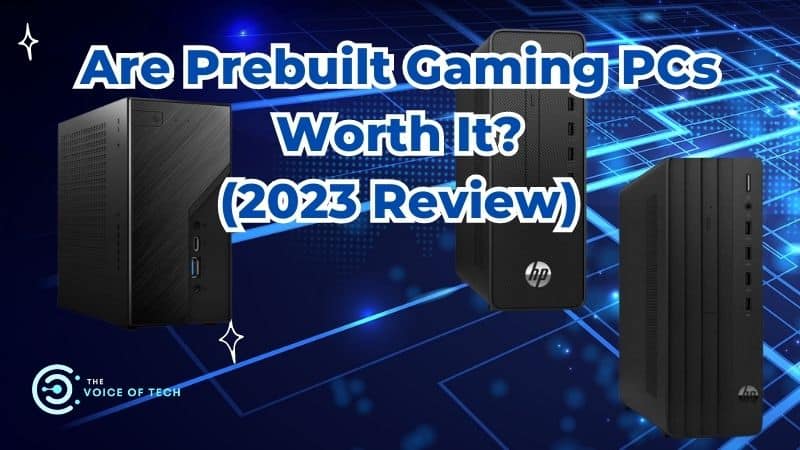
Expert Consulted: Adrian Gardiner. Years of experience buying both computers and computer parts for my own new customer builds has given me a keen eye for spotting great deals when shopping. In this article, I’ll be sharing my knowledge and tips to help you get the answers you need.
In recent years, the gaming world has changed a lot, giving gamers many options for their gaming setups. In particular, now the decision has to be between buying a prebuilt gaming PC or building one yourself.
Prebuilt gaming PCs give you the benefit of professional assembly and testing and less hassle, while self-built systems give you more personalization options and often better value.
This article will analyze the pros and cons of prebuilt gaming PCs, discussing aspects like cost, performance, customization, ease of upgrading, and warranties, to determine their value for gamers and finally to answer the question; ‘Are prebuilt gaming PCs worth it?
If you want the convenience of having your gaming PC built for you, with the benefits of a single point of contact for any warranty and support issues then prebuilt is the way to go. However, if you are ok with the thought of building your own PC, you’ll enjoy benefits like better performance, many customization options, and usually better value.
Read on to find out the reasons for our answer above and which is right for you.
Related Article: How to build a gaming PC for under $1000
Are Prebuilt Gaming PCs Worth It? Pros & Cons Analysed
All of the reasons why you should consider going one way or the other are addressed in the following sections to help you with your choice.
Cost
One of the main concerns for gamers when acquiring a gaming PC is the cost. Prebuilt gaming PCs often come with a heftier price tag compared to building your own system, especially when you look at what you’re getting for your money in terms of performance.
The extra cost of a prebuilt will come from various factors like assembly costs, warranty coverage, and the brand value of the company selling the prebuilt system (you’ll usually pay more for a well-known and reputable brand-name product).
Costly Prebuilt Repairs
Prebuilt computers often have custom-made parts that cannot be easily repaired or replaced. This means that once a prebuilt computer is out of warranty and a part fails, if it’s anything other than RAM, Storage, or a dedicated Graphics Card you may be out of luck getting replacement parts.
Even if you can get the parts the cost is likely to be exorbitant. A self-build PC goes a long way to eliminating this issue by using off-the-shelf parts that are much easier to obtain and at lower cost too.
However, the convenience offered by a prebuilt gaming PC is often enough to override the concern of any extra cost(s) involved. It all depends on the individual and their particular circumstances.
Performance

When judging the gaming performance of a gaming PC, the main bits of hardware that contribute to a seamless and enjoyable experience are the processor (CPU), graphics card (GPU), memory (RAM), and storage. Getting these right at the start can make a huge difference to its performance.
Ultimate Flexibility with Self Builds
If you choose to build your own gaming PC, you have the ultimate flexibility to select components that cater to your exact gaming preferences, like a nice case for example.
For example, you could go to http://www.systemrequirementslab.com and find out exactly what hardware you need in your gaming PC to play certain games and then build it accordingly.
A prebuilt PC will have been built for a wider audience and may not be right for what you need – finding the perfect prebuilt is not an easy task.
Customization
One of the significant advantages of assembling your own gaming PC is the high level of customization available.
You can handpick every single component that goes into your system, enabling you to create a genuinely unique gaming machine tailored to your exact preferences.
This includes not only the internal components but also the aesthetics of your PC, such as the case, lighting (LED fans, light strips to motherboards with built-in LED accent lights), and cable management. You really can make it look totally unique from anything else out there.
Prebuilt gaming PCs, on the other hand, offer very limited customization options.
While some companies may provide a selection of components and case options, the choices are often restricted to a specific and limited range of product options choices like adding extra RAM, storage, and maybe a better graphics card.
Additionally, upgrading a prebuilt system can be a challenge, as some manufacturers often use proprietary components that are difficult to replace or upgrade (especially if you’re out of warranty), such as motherboards or power supply units, both of which I’ve had the misfortune to come across when they’ve gone wrong.
Warranty and Support

One of the key advantages of purchasing a prebuilt gaming PC is the warranty and support that comes with it. Most prebuilt systems come with a warranty that covers the entire system, including all of the components, instead of having to contact multiple suppliers to get support for each individual part.
This can provide peace of mind, particularly for those who are inexperienced in building PCs and may be concerned about potential issues that could arise from the assembly process.
In addition to the warranty, prebuilt gaming PC companies often provide good customer support, which can be invaluable if you encounter any issues with your system. Peace of mind on the end of a phone line can be a big plus for many.
When you build your own gaming PC, the warranties for individual components are typically separate, and you will need to deal with each manufacturer individually if you encounter any issues.
This can be a time-consuming and frustrating process, particularly if you are unsure which component is causing the problem.
Also, you will not have access to the same level of customer support as you would with a prebuilt system, as you will be responsible for troubleshooting and resolving any issues on your own.
Ease of Use
For those who are new to the world of PC gaming or lack experience in building computers, prebuilt gaming PCs offer a much simpler and more convenient solution to getting started faster and gaming right away.
These systems are professionally assembled and tested, ensuring that they are ready to be used right out of the box.
You can simply plug in your new gaming PC and start playing your favorite games without having to worry about putting everything together or possible issues that could come about from building your own system.
Building your own gaming PC can be a rewarding experience, but it also comes with its own set of challenges. The build process can take a while, especially for those who are not familiar with the inner workings of a computer.
Additionally, there is always the risk of making mistakes while assembling all the parts, which could result in damage to the components or a non-functioning system.
Prebuilt Pros and Cons

Prebuilt gaming computers do offer a convenient and usually reliable solution for gamers who don’t want to build their own PCs.
However, there are some pros and cons to consider when deciding if a prebuilt gaming computer is the right choice for you.
Pros
- Convenience: Prebuilt gaming computers come assembled and ready to go, saving you time and effort compared to building your own gaming computer
- Warranty and support: Most prebuilt systems come with a great warranty that covers the entire machine and any accessories, and manufacturers typically provide comprehensive customer support for their products
- Quality control: Prebuilt computers are assembled by trained staff and undergo extensive testing to ensure that all parts work properly before everything is shipped to you
- Aesthetics: Prebuilt systems often feature coordinated designs and attractive cases, making them an appealing option for those who value how attractive the computer looks
- No building experience required: For those who lack experience or confidence in building their own PCs, prebuilt gaming computers provide a hassle-free alternative.
Cons
- Price: Prebuilt gaming computers often carry a higher price tag compared to the cost of the individual components, reflecting their need to cover the cost of assembling the system, warranty, and other services that may be offered
- Limited customization: While some manufacturers allow for limited customization, prebuilt computers generally don’t offer the same level of flexibility as building your own gaming PC from scratch
- Proprietary components: Some prebuilt systems use proprietary parts, which can make future upgrades or repairs more difficult and expensive. I’ve seen this a lot and it can turn out very expensive if, say, the motherboard needs replacement and the warranty has finished
- Bloatware: Prebuilt systems usually come with unnecessary bloatware (unwanted software programs) preinstalled, which can slow down performance and take up storage space (some suppliers actively minimize bloatware and advertise it as a feature!)
- Potentially outdated components: Depending on the manufacturer’s update schedule, prebuilt systems might contain components that are slightly outdated or not the best value for your budget (usually this would not be too far out of date if at all).
Conclusion
Deciding between a prebuilt gaming PC or building your own depends on your personal preferences, budget, and experience working with computers, although it’s really not that complicated to build a gaming PC (especially with all the help available online these days).
Prebuilt PCs do offer convenience, easier access to a warranty for everything in one place, included support, and would be ideal for those who value ease of use.
On the flip side, building your own PC can be more cost-effective with much greater customization options and faster performance.
Although it does require a bit of time and effort to learn about the hardware and assembly, most find building their own computer very rewarding.

